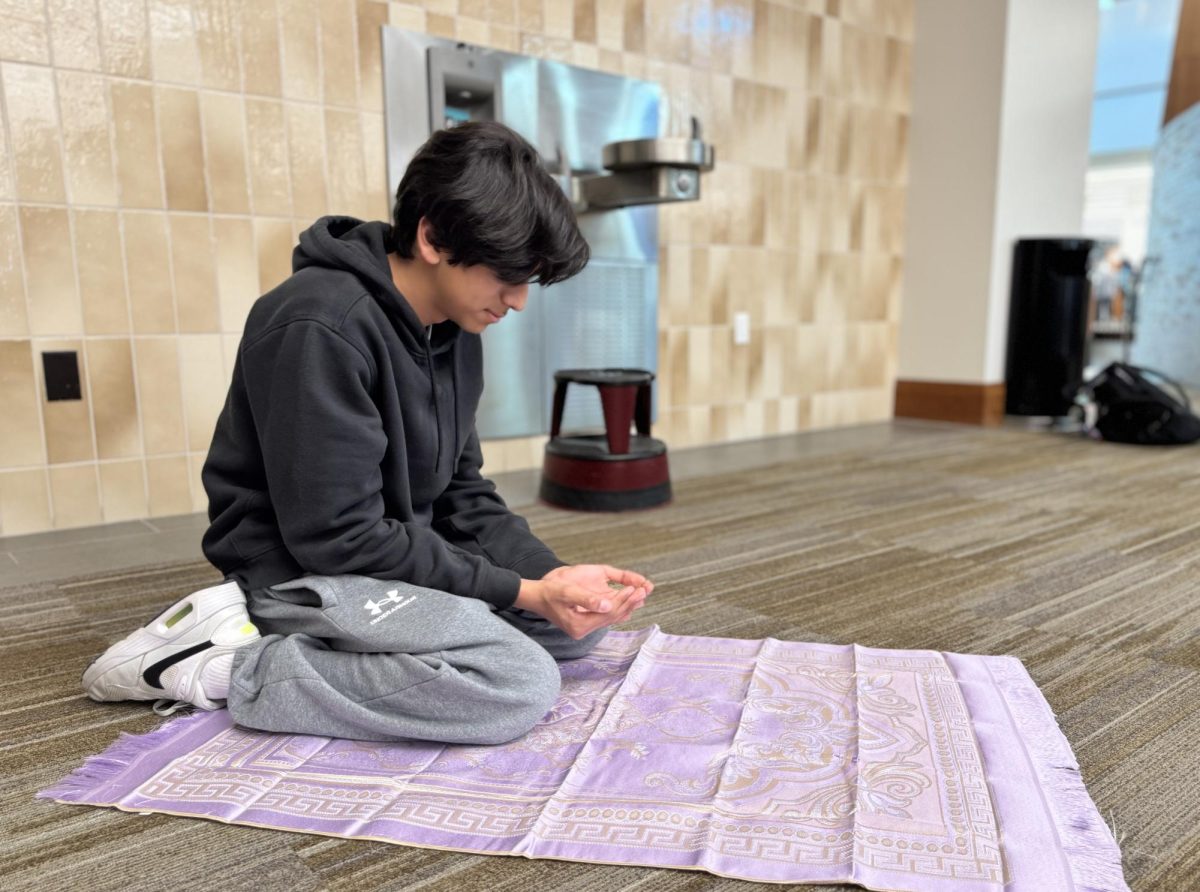For sports fans and video game aficionados alike, fantasy sports combine the best of both worlds. Players act as owners of sports teams to compete against other players’ teams, with results based on the success of the actual team.
According to the Fantasy Sports Trade Association, 32 million people in the United States and Canada played fantasy sports during 2010, often with money involved.
One of those 32 million is Josh Roop, Fantasy Sports Club co-president and senior, and current participant in three fantasy football leagues. “(I like fantasy football) just because everyone else does it, and everyone focuses on it,” Roop said.
According to Mike Meyer, Fantasy Sports Club sponsor, the club was created in 2004 as fantasy sports have become more popular over time. Fantasy Sports Club allows students to participate in a fantasy sports league after school.
While the club does not allow gambling, students like Roop can and do make wagers in other leagues outside of school. These wagers usually are small amounts, according to Roop.
“I usually play for money in almost every league except for the one at school because the school doesn’t allow it,” Roop said.
Legal “gambling”
According to Meyer, granting members of Fantasy Sports Club the ability to bet in school would signify that this school approves of gambling, so as a result betting is not allowed within the club.
“I try to emphasize on students that they need to wait until they’re older to start betting money or gamble,” Meyer said.
Although gambling is restricted in the United States, betting in fantasy sports (the school’s Fantasy Sports Club excluded), is generally legal under most circumstances. According to the Unlawful Internet Gambling Enforcement Act of 2006, gambling in fantasy sports is legal if it is not on a single player or event. Since gambling addictions can often lead to debt or even bankruptcy, it is natural that minors are typically barred from betting money.
However, according to Roop, there are benefits to betting in fantasy sports if managed responsibly.
“It’s good (to play for money) if you can control it. I think you should use a reasonable amount,” Roop said. “I don’t think you should be gambling $300 on fantasy sports.”
Gambling as incentive
Although gambling can potentially lead to debt and other consequences, the argument can be made that betting money in fantasy sports gives participants more of an incentive to win. Meyer, too, said he occasionally bets on some of his fantasy sports teams outside of school.
“I don’t mind playing for money because I usually only play for a small amount. It puts a bit more excitement and competitiveness into (fantasy sports),” Meyer said.
However, Josh Horowitz, fantasy sports enthusiast and junior, said he believes betting in fantasy sports is entirely different from gambling.
“Fantasy sports are more for fun and in gambling you’re betting on something,” Horowitz said. “You don’t have to bet in fantasy sports.”
Unlike Roop, Horowitz only participates in fantasy sports outside of school and is not involved in the Fantasy Sports Club here. Even so, Horowitz said he finds fantasy sports enjoyable without a monetary influence, as the risk of possibly losing money is not worth the chance of winning.
“Once in a while there will be a league for money, but I usually don’t play for money. I don’t like (playing for money) because I don’t like to gamble. I like to save my money.” Horowitz said.
Jason Roebuck, co-president of Fantasy Sports Club and senior, said he does not bet money on his fantasy sports teams, and as a result he does not see fantasy sports as a type of gambling because of its nature.
“Fantasy sports could be seen as gambling because you are putting money down and risking it, but I just play for fun so I don’t see it as gambling. I just don’t like risking any money in case I don’t win,” Roebuck said.
Not all about gambling
Fantasy sports can be related to gambling because if played for money, they have similar risks. However, unlike gambling, it is not necessary to bet money to partake in them. Students play fantasy sports for many other reasons besides gambling.
According to Roop, fantasy sports give him a good opportunity to talk about sports with other people that have similar interests.
Roop said, “It’s interesting to see what other people think (about sports) and debate about it.”
Roebuck said he agrees with Roop, adding that fantasy sports can be enjoyable without betting.
“I love the competitiveness in the club and the energy that everyone brings,” Roebuck said. “We have many different kids in the club and fantasy sports bring them together.”































![AI in films like "The Brutalist" is convenient, but shouldn’t take priority [opinion]](https://hilite.org/wp-content/uploads/2025/02/catherine-cover-1200x471.jpg)













































![Review: “The Immortal Soul Salvage Yard:” A criminally underrated poetry collection [MUSE]](https://hilite.org/wp-content/uploads/2025/03/71cju6TvqmL._AC_UF10001000_QL80_.jpg)
![Review: "Dog Man" is Unapologetically Chaotic [MUSE]](https://hilite.org/wp-content/uploads/2025/03/dogman-1200x700.jpg)
![Review: "Ne Zha 2": The WeChat family reunion I didn’t know I needed [MUSE]](https://hilite.org/wp-content/uploads/2025/03/unnamed-4.png)
![Review in Print: Maripaz Villar brings a delightfully unique style to the world of WEBTOON [MUSE]](https://hilite.org/wp-content/uploads/2023/12/maripazcover-1200x960.jpg)
![Review: “The Sword of Kaigen” is a masterpiece [MUSE]](https://hilite.org/wp-content/uploads/2023/11/Screenshot-2023-11-26-201051.png)
![Review: Gateron Oil Kings, great linear switches, okay price [MUSE]](https://hilite.org/wp-content/uploads/2023/11/Screenshot-2023-11-26-200553.png)
![Review: “A Haunting in Venice” is a significant improvement from other Agatha Christie adaptations [MUSE]](https://hilite.org/wp-content/uploads/2023/11/e7ee2938a6d422669771bce6d8088521.jpg)
![Review: A Thanksgiving story from elementary school, still just as interesting [MUSE]](https://hilite.org/wp-content/uploads/2023/11/Screenshot-2023-11-26-195514-987x1200.png)
![Review: "When I Fly Towards You", cute, uplifting youth drama [MUSE]](https://hilite.org/wp-content/uploads/2023/09/When-I-Fly-Towards-You-Chinese-drama.png)
![Postcards from Muse: Hawaii Travel Diary [MUSE]](https://hilite.org/wp-content/uploads/2023/09/My-project-1-1200x1200.jpg)
![Review: "Ladybug & Cat Noir: The Movie," departure from original show [MUSE]](https://hilite.org/wp-content/uploads/2023/09/Ladybug__Cat_Noir_-_The_Movie_poster.jpg)
![Review in Print: "Hidden Love" is the cute, uplifting drama everyone needs [MUSE]](https://hilite.org/wp-content/uploads/2023/09/hiddenlovecover-e1693597208225-1030x1200.png)
![Review in Print: "Heartstopper" is the heartwarming queer romance we all need [MUSE]](https://hilite.org/wp-content/uploads/2023/08/museheartstoppercover-1200x654.png)

